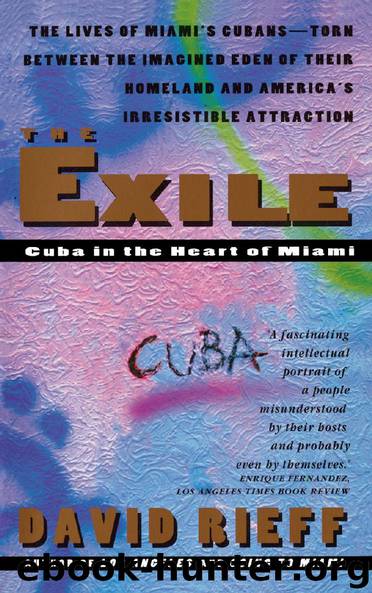The Exile by David Rieff

Author:David Rieff
Language: eng
Format: epub
Publisher: Touchstone
7
IT WAS PRECISELY the exile’s abiding experience of defeat, its embittered familiarity with cycle after cycle of hopes raised only to be dashed, far more than whatever degree of economic success it had wrested for itself in Dade County or its sense of being culturally at ease there, that really accounted for the central role Miami continued to play in the imaginations of Cuban refugees, their children, and their grandchildren, whether or not they actually chose to live in the city. After all, for all the political passions that had swept Miami since Cuban refugees first began arriving there in 1959, almost every one of the exile’s organized ventures, from 1959 until the collapse of the Soviet empire, and whether military or political, had ended in failure. Hard-line Cuban Miamians might take comfort from the fact that, from Vietnam to Nicaragua, Cuban-Americans had helped fight, and, according to some, win, the Cold War. One of their number, Felix Rodriguez, had become a career CIA officer, and could boast of having helped capture Che Guevara in the Bolivian altiplano in 1967 and of organizing the resupply of the Nicaraguan Contras in the mid-nineteen-eighties. But even Rodriguez, in his memoir, Shadow Warrior, conceded a certain feeling of frustration. “Sometimes I feel a bit like Ulysses,” he wrote. “Like him, I am from an island nation. Like him, I went to war. And like him, I am having a hard time getting home.”
Despite Rodriguez’s military exploits, and Jorge Mas Canosa’s lobbying, the political importance to the Republican party of Cuban-American voters, and, for that matter, their readiness to contribute to the coffers of Democratic politicians like Congressman Torricelli who were ready to support their cause, the exile had little to show for its efforts. Mas Canosa might be received by Yeltsin, and candidates for high office in the United States might bend over backwards demonstrating their support for legislation like the Cuban Democracy Act, but the fact remained that Fidel Castro was still in Havana and the exile could still not go home. Whatever the degree of Cuban self-absorption—and it was so celebrated among Cubans themselves that there was even a well-known term for it, el ombliguismo de Cuba, roughly translated, “the sense of Cuba as being the navel of the universe,” an idea whose history can be traced back to José Martí himself—most exiles, even at their most grandiloquent, understood perfectly well that they belonged to a small diaspora whose claims were unlikely to be taken seriously all that much longer in a world increasingly used to far larger historical injustices than the one el exilio had suffered. But if they could not command the attention of the world outside Miami for very long, at least they could make el tema the theme of the city as a whole. And in establishing in Miami a simulacrum convincing both to themselves and to outsiders of the Cuba they had lost, the exiles could demonstrate that theirs was not solely a story of defeat.
Download
This site does not store any files on its server. We only index and link to content provided by other sites. Please contact the content providers to delete copyright contents if any and email us, we'll remove relevant links or contents immediately.
| African-American Studies | Asian American Studies |
| Disabled | Ethnic Studies |
| Hispanic American Studies | LGBT |
| Minority Studies | Native American Studies |
Cecilia; Or, Memoirs of an Heiress — Volume 1 by Fanny Burney(31333)
Cecilia; Or, Memoirs of an Heiress — Volume 3 by Fanny Burney(30934)
Cecilia; Or, Memoirs of an Heiress — Volume 2 by Fanny Burney(30889)
The Great Music City by Andrea Baker(21318)
We're Going to Need More Wine by Gabrielle Union(18074)
Bombshells: Glamour Girls of a Lifetime by Sullivan Steve(13109)
Pimp by Iceberg Slim(12932)
All the Missing Girls by Megan Miranda(12752)
Fifty Shades Freed by E L James(12451)
Norse Mythology by Gaiman Neil(11883)
Talking to Strangers by Malcolm Gladwell(11879)
Crazy Rich Asians by Kevin Kwan(8351)
Mindhunter: Inside the FBI's Elite Serial Crime Unit by John E. Douglas & Mark Olshaker(7834)
The Lost Art of Listening by Michael P. Nichols(6474)
Enlightenment Now: The Case for Reason, Science, Humanism, and Progress by Steven Pinker(6406)
Bad Blood by John Carreyrou(5769)
The Four Agreements by Don Miguel Ruiz(5511)
Weapons of Math Destruction by Cathy O'Neil(5037)
We Need to Talk by Celeste Headlee(4870)
